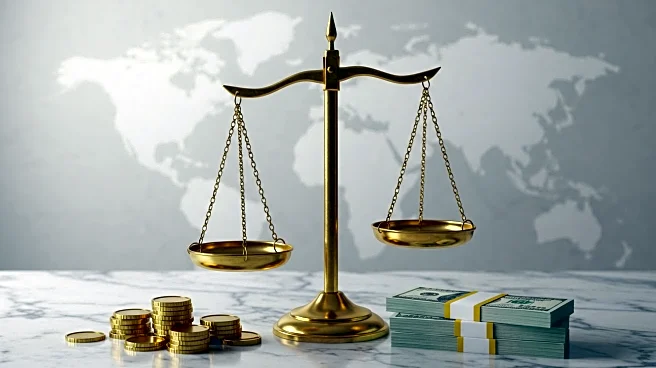What is the story about?
What's Happening?
A federal appeals court has ruled in favor of President Trump, allowing him to withhold approximately $2 billion in foreign aid payments. This decision overturns a previous order by District Judge Amir Ali, which had blocked the administration's plans to reduce disbursements from the US Agency for International Development (USAID). The ruling was made by a panel of judges on the US Court of Appeals for the District of Columbia, with Judge Karen Henderson noting that the plaintiffs lacked standing to challenge the funding freeze. The nonprofits involved in the lawsuit argued that the president exceeded his authority by cutting congressionally approved spending. However, the court determined that only the Government Accountability Office had the standing to contest the president's order under the Impoundment Control Act of 1974.
Why It's Important?
The court's decision to allow President Trump to cut foreign aid has significant implications for U.S. foreign policy and international relations. The reduction in aid could affect numerous projects and organizations that rely on USAID funding, potentially impacting global health initiatives, economic development programs, and humanitarian efforts. This move aligns with Trump's 'America First' policy, emphasizing domestic priorities over international commitments. Critics argue that such cuts could undermine U.S. influence abroad and damage relationships with allied nations. The ruling also highlights ongoing debates about executive power and the balance of authority between the presidency and Congress.
What's Next?
Following the court's decision, the Trump administration is expected to proceed with its plans to reduce foreign aid spending. The State Department has outlined intentions to eliminate approximately $60 billion in aid and terminate a significant portion of USAID grants. This could lead to further legal challenges from affected organizations and potential pushback from Congress, which may seek to restore funding through legislative measures. The decision may also prompt discussions on the future role of USAID and the effectiveness of U.S. foreign aid strategies.
Beyond the Headlines
The ruling raises questions about the ethical and legal dimensions of foreign aid distribution and the potential consequences of reduced U.S. involvement in global development. It may trigger long-term shifts in how aid is allocated and managed, with increased scrutiny on the efficiency and impact of aid programs. Additionally, the decision could influence other countries' approaches to foreign aid, as they observe the U.S.'s prioritization of domestic over international interests.















